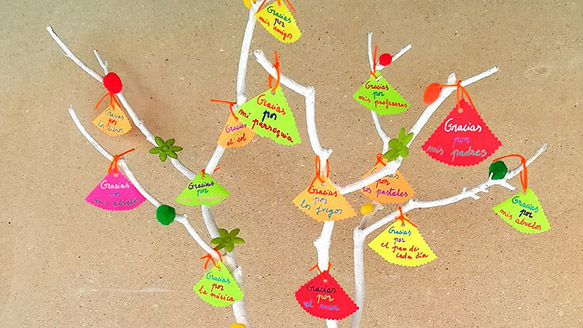Whether we’re young and old, we sometimes forget that we have many reasons to be grateful every day. Some of them are small things we might consider trifles, but others are not so small. No matter their relative importance, it’s good to recognize them all!
Teaching this to children is a key task for parents. It’s important to help them see and appreciate what others do for them and the things they have—or don’t have—and learn to recognize and appreciate the generosity of others.
Do I thank God for everything?
If we teach children to be thankful, we’ll help them to discover all the reasons they have to be happy, such as family and friends, school and their teachers, the wonders of nature, or the food they eat every day.
Of course, we should also thank God for his love for us. That comes first. We’re His creatures, created by Him.
It’s fundamental to transmit this idea to children: Despite our weaknesses and failings, God loves us. It’s something to be thankful for.
Saying “thank you”
In fact, without gratitude we’re blind to an important part of reality. We can live surrounded by many good things, but we’re incapable of seeing and appreciating them. Moreover, being ungrateful keeps us from being optimistic.
Pope Francis has reminded us on several occasions that saying the words “may I,” “I’m sorry” and “thank you” are key in family life. If these three expressions are part of our daily family vocabulary, our family will continue to grow and strengthen. For this reason, we should analyze how many times a day we say them.
Having a grateful heart
We should also educate our children to have a grateful heart. This way, they’ll learn to see the positive side of setbacks—how adversity teaches us lessons and helps us grow—and they’ll discover how fortunate they are to live the life they lead. All these circumstances will encourage them to be generous and to offer others something in return.
It’s a well-known fact that gratitude can increase our happiness and well-being, and that having a grateful attitude in life brings many mental and physical benefits.
In the end, recognizing what is positive about the good things in our lives, and even the not-so-good ones, helps us face our day-to-day life better.
How to teach gratitude
Although talking to our children about gratitude is necessary, our actions will ultimately be much more effective. If we ourselves express gratitude daily and directly, and show that gratitude by doing good for others, our children will see what this virtue really means.
We can also help raise our family’s awareness and gratitude by doing things such as keeping a gratitude journal, painting messages of gratitude decoratively on small flat rocks and using them as gifts or decoration, or writing things we’re grateful for on paper decorations and hanging them on a tree or branch inside our house.



